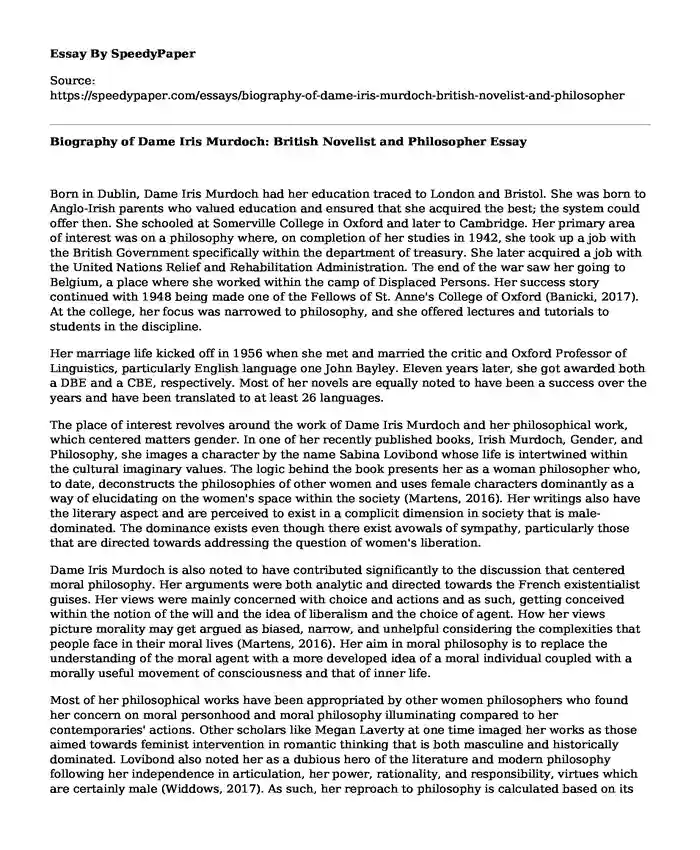
| Type of paper: | Essay |
| Categories: | English literature Philosophy |
| Pages: | 3 |
| Wordcount: | 700 words |
Born in Dublin, Dame Iris Murdoch had her education traced to London and Bristol. She was born to Anglo-Irish parents who valued education and ensured that she acquired the best; the system could offer then. She schooled at Somerville College in Oxford and later to Cambridge. Her primary area of interest was on a philosophy where, on completion of her studies in 1942, she took up a job with the British Government specifically within the department of treasury. She later acquired a job with the United Nations Relief and Rehabilitation Administration. The end of the war saw her going to Belgium, a place where she worked within the camp of Displaced Persons. Her success story continued with 1948 being made one of the Fellows of St. Anne's College of Oxford (Banicki, 2017). At the college, her focus was narrowed to philosophy, and she offered lectures and tutorials to students in the discipline.
Her marriage life kicked off in 1956 when she met and married the critic and Oxford Professor of Linguistics, particularly English language one John Bayley. Eleven years later, she got awarded both a DBE and a CBE, respectively. Most of her novels are equally noted to have been a success over the years and have been translated to at least 26 languages.
The place of interest revolves around the work of Dame Iris Murdoch and her philosophical work, which centered matters gender. In one of her recently published books, Irish Murdoch, Gender, and Philosophy, she images a character by the name Sabina Lovibond whose life is intertwined within the cultural imaginary values. The logic behind the book presents her as a woman philosopher who, to date, deconstructs the philosophies of other women and uses female characters dominantly as a way of elucidating on the women's space within the society (Martens, 2016). Her writings also have the literary aspect and are perceived to exist in a complicit dimension in society that is male-dominated. The dominance exists even though there exist avowals of sympathy, particularly those that are directed towards addressing the question of women's liberation.
Dame Iris Murdoch is also noted to have contributed significantly to the discussion that centered moral philosophy. Her arguments were both analytic and directed towards the French existentialist guises. Her views were mainly concerned with choice and actions and as such, getting conceived within the notion of the will and the idea of liberalism and the choice of agent. How her views picture morality may get argued as biased, narrow, and unhelpful considering the complexities that people face in their moral lives (Martens, 2016). Her aim in moral philosophy is to replace the understanding of the moral agent with a more developed idea of a moral individual coupled with a morally useful movement of consciousness and that of inner life.
Most of her philosophical works have been appropriated by other women philosophers who found her concern on moral personhood and moral philosophy illuminating compared to her contemporaries' actions. Other scholars like Megan Laverty at one time imaged her works as those aimed towards feminist intervention in romantic thinking that is both masculine and historically dominated. Lovibond also noted her as a dubious hero of the literature and modern philosophy following her independence in articulation, her power, rationality, and responsibility, virtues which are certainly male (Widdows, 2017). As such, her reproach to philosophy is calculated based on its frequent disregard for the experiences of women. Her convictions have, however, presently changed. She is not only a writer of philosophies that centers around women but all things as a whole whether male and women because each has significant representation.
In summary, Dame Iris Murdoch is noted as both a scholar and a philosopher. As a scholar, she has contributed to different fields, with one of them being literature through different writings and compositions, as noted in her novels. As a philosopher, most of her philosophers centered on women, as noted herein.
References
Banicki, K. (2017). Iris Murdoch and the varieties of virtue ethics. In Varieties of virtue ethics (pp. 89-104). Palgrave Macmillan, London.
Martens, P. (2016). Iris Murdoch: Kierkegaard as Existentialist, Romantic, Hegelian, and Problematically Religious. In Volume 11, Tome III: Kierkegaard's Influence on Philosophy (pp. 149-170). Routledge.
Widdows, H. (2017). The moral vision of Iris Murdoch. Routledge.
Cite this page
Biography of Dame Iris Murdoch: British Novelist and Philosopher. (2023, Mar 14). Retrieved from https://speedypaper.com/essays/biography-of-dame-iris-murdoch-british-novelist-and-philosopher
Request Removal
If you are the original author of this essay and no longer wish to have it published on the SpeedyPaper website, please click below to request its removal:
- Free Essay Sample: Money and Happiness
- Free Essay on Different Market Structures for Businesses and Consumers.
- Psychopharmacology of Alcohol and Drugs, Essay Sample for Free
- Essay Example on the Value Statistical Life
- Conflict Resolution: Challenges of Social Support
- Essay Example on the Effects of Cold War in U.S on Politics and Culture
- Essay Sample: A Theoretical Essay on Rational Choice
Popular categories




